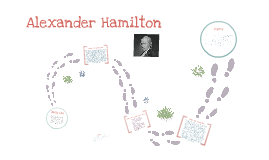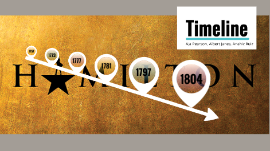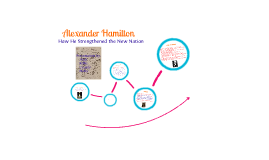Alexander Hamilton
Transcript: "It is not tyranny we desire; it's a just, limited, federal government." Constitutions should consist only of general provisions; the reason is that they must necessarily be permanent, and that they cannot calculate for the possible change of things. Quotes: Impact on the Success of the Revolution Strong advocate of colonial unification to defeat the British (refutes of Revered Samuel Seabury). Aide to General George Washington (drafted and handled his letters, advised him in military and diplomatic matters) Instrumental leader in the Battle of Yorktown. After the Revolution Legacy After the Battle of Yorktown, Hamilton was elected as a member of Congress, serving in 1782 and 1783. He practiced law in the New York bar for four years, and in 1787, he was one of New York's delegates to the Constitutional Convention, where he spoke in favor of a strong federal government. He is the main author of the Federalist Papers, 85 papers that explain the new Constitution, which also made him the widely accepted founder of the Federalist Party. From 1789-1795, Hamilton was the first Secretary of the Treasury of the United States and adviser to President Washington. From 1798 to 1800, Hamilton served as President Adams' Inspector General and General of the United States Army. He continued to be an influential player in politics; after his case against New York Governor candidate Aaron Burr in 1804, causing Burr to lose the election, Burr challenged Hamilton to a pistol duel, which Hamilton lost, resulting in his death on July 12, 1804. Early Life Alexander Hamilton was born on January 11, 1755, to Rachel Fawcett, out of wedlock, on the island of Nevis in the British West Indies. He spent most of his childhood on the island of St. Croix. After his father, James Hamilton, abandoned him in 1765, and his mother died in 1768, Hamilton began living on his own. He worked with a mercantile firm on the island for four years and soon became recognized by the wealthy citizens of the island for his vast intellectual potential. With donations from them, he was sent to the American colonies in 1772 to attend King's College (now Columbia university) in New York. He began political writings as early as 1774 and dropped out of college in 1775. In 1774 and 1775, Hamilton published his first political writings, which stated that uniting the colonies was the only way to gain independence. Shortly after, Hamilton became an officer in the Continental Army. He led an artillery unit called the Hearts of Oak to several important victories from 1776 to 1777 at battles such as the Battle of White Plains and the Battle of Trenton in New York. He was then promoted to Lieutenant Colonel and right hand man to General George Washington. Four years later, in 1781, Hamilton led a light infantry unit that was key to victory in the Battle of Yorktown, the battle famous as the moment of American Victory in the Revolutionary War. During the Revolution Alexander Hamilton Author of the majority of the Federalist papers and an important factor in the successful ratification of the Constitution Founder of the Federalist Party First Secretary of the Treasury Founder of the first national bank and the United States Mint Created a strong young economy for the United States

















